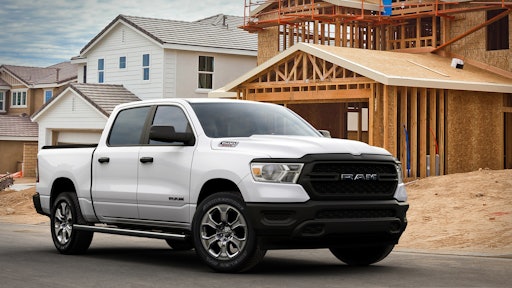The gas-powered Ram 2500 gets around 14-15 mpg, while the diesel version gets around 18-20 mpg. The Ram 2500 is available with both gas and diesel engines, each offering different fuel economy.
When deciding between the two, it’s important to consider your specific needs and usage. Gas engines are ideal for lighter to moderate hauling and towing, while diesel engines are better suited for heavier loads and long-distance driving. Understanding the MPG differences between the gas and diesel versions can help you make an informed decision based on your requirements and priorities.
We will explore the factors affecting the gas and diesel MPG of the Ram 2500, allowing you to make the best choice for your driving needs.

Engine Comparison
Gas Engine
The Ram 2500 gas engine, renowned for its remarkable performance, offers a compelling blend of power and efficiency. With an impressive horsepower, it delivers robust acceleration and towing capability.
The gas engine is an excellent choice for those seeking a balance between power and fuel economy, making it highly versatile for various driving needs.
In addition, this engine is relatively more affordable to maintain and repair, offering a cost-effective long-term ownership experience.
Diesel Engine
On the other hand, the Ram 2500 diesel engine is recognized for its exceptional torque and towing capacity, ideal for heavy-duty applications.
This engine excels in long-haul journeys and heavy towing, making it a preferred option for those requiring unparalleled towing capabilities.
While the diesel engine may have a higher initial cost, it compensates with superior fuel efficiency, lower-end torque, and extended engine longevity, providing a compelling long-term investment.

Credit: www.amazon.com
Fuel Efficiency
Fuel efficiency is a crucial consideration when choosing between a Ram 2500 gas and diesel model. Understanding the MPG differences between gas and diesel engines can help you make an informed decision before purchasing your next heavy-duty truck.
Factors Affecting Mpg
The fuel efficiency of a Ram 2500 can be influenced by various factors, including engine type, driving habits, vehicle weight, tire pressure, and aerodynamics.
Performance In Various Terrains
When driving in different terrains, such as city streets, highways, or off-road conditions, the fuel efficiency of the Ram 2500 may vary due to the engine’s workload and the demand for power.
Cost Analysis
When comparing the Ram 2500 gas vs diesel in terms of MPG, the cost analysis plays a crucial role in decision-making. Understanding the initial investment and maintenance costs over time is essential for discerning which option is more economical in the long run.
Initial Investment
- Higher upfront cost for diesel models due to advanced technology.
- Gas models are generally more affordable at the time of purchase.
Maintenance Costs Over Time
- Diesel Engine: Requires specialized services which can be more expensive.
- Gas Engine: Generally lower maintenance costs compared to diesel.
- Regular maintenance for both engines is crucial for longevity and optimal performance.
Emissions And Environmental Impact
The Ram 2500 gas and diesel models have different MPG ratings, impacting their emissions and environmental footprint. The diesel version typically offers higher MPG, emitting less CO2 compared to the gas model. Consider the environmental impact when choosing between the two.
Pollutants Released
When comparing the Ram 2500 Gas and Diesel models in terms of emissions and environmental impact, it is essential to consider the pollutants released. Both vehicles contribute to air pollution, but the types and amounts of pollutants emitted differ. Gasoline engines typically emit higher levels of carbon monoxide, nitrogen oxides, and volatile organic compounds (VOCs). On the other hand, diesel engines emit lower levels of these pollutants but have higher emissions of particulate matter and nitrogen dioxide. Here is a comparison in a table format:| Pollutant | Ram 2500 Gas | Ram 2500 Diesel |
|---|---|---|
| Carbon Monoxide (CO) | Higher | Lower |
| Nitrogen Oxides (NOx) | Higher | Lower |
| Volatile Organic Compounds (VOCs) | Higher | Lower |
| Particulate Matter (PM) | Lower | Higher |
| Nitrogen Dioxide (NO2) | Lower | Higher |
Long-term Effects
Considering the long-term effects, the emissions from both gasoline and diesel engines have significant environmental impacts. While gasoline engines release greenhouse gases such as carbon dioxide (CO2) and methane, diesel engines emit more nitrogen oxides and particulate matter that contribute to climate change and air pollution. The release of carbon dioxide, a greenhouse gas, contributes to global warming and climate change. Methane, another potent greenhouse gas produced by fossil fuel combustion, further exacerbates the greenhouse effect. On the other hand, nitrogen oxides and particulate matter can lead to respiratory issues, lung damage, and cardiovascular problems when inhaled. Tables and bullet-points provide a concise and easily understandable way to compare the emissions of Ram 2500 Gas and Diesel models. The comparison highlights the differences in pollutant levels and allows consumers to make informed decisions about their environmental impact. It is crucial to consider these long-term effects when choosing between gas and diesel-powered vehicles to minimize harmful consequences and contribute to a more sustainable future.User Experience
Comparing the Ram 2500 Gas and Diesel Mpg, the user experience centers on the efficiency and power of the two engines. The decision on whether to choose gas or diesel hinges on individual driving needs and preferences. By evaluating their specific requirements, drivers can make an informed choice based on their unique user experience.
Driver Preferences
In the realm of heavy-duty trucks, the Ram 2500 is a renowned choice that boasts impressive power and capability. When it comes to fuel efficiency, however, drivers face a crucial decision; gas or diesel? Each option has its distinctive advantages, and user preferences play a key role in making the right choice.
Some drivers prefer the gas-powered Ram 2500 due to its ease of use and availability. Gasoline engines require less maintenance, making them an attractive choice for those looking for a hassle-free driving experience. Additionally, gas stations are more common, ensuring convenient refueling options for gas-powered trucks when needed.
On the other hand, many drivers favor the diesel-powered Ram 2500 for its legendary towing capacity and improved fuel efficiency. Diesel engines excel in providing the low-end torque necessary to tackle heavy loads effortlessly. For drivers who frequently haul heavy trailers or engage in demanding towing tasks, the diesel option is often the preferred choice.
Real-world Mpg Feedback
Real-world feedback from Ram 2500 owners sheds light on the actual fuel efficiency experienced by drivers. While official EPA estimates provide some guidance, they may not capture the full picture under real-world driving conditions. Owners’ feedback allows for a more comprehensive understanding of the Ram 2500’s MPG performance.
A closer look at user feedback reveals that the gas-powered Ram 2500 achieves an average of 12-15 MPG in mixed driving conditions. This range is impressive, considering the truck’s heavy-duty nature. The availability of gas stations across the country ensures that drivers can easily find fuel wherever their journeys take them.
On the other hand, diesel-powered Ram 2500 owners report higher MPG figures, with an average of 15-19 MPG in similar driving conditions. Although diesel fuel prices may be higher, the increased efficiency offsets the cost difference over time for drivers who frequently cover long distances or tow heavy loads.
It’s important to note that individual driving habits, load weights, and road conditions can affect MPG figures. While these averages provide a general idea, real-world fuel efficiency may vary. Therefore, it is always advisable to analyze one’s specific usage and preferences before making a decision.

Credit: www.forconstructionpros.com
Resale Value
The resale value of a Ram 2500 Gas vs Diesel MPG is a crucial factor to consider when purchasing a truck. Let’s delve into the depreciation rates and factors influencing value for these vehicles.
Depreciation Rates
Depreciation rates for Ram 2500 Gas and Diesel models vary based on factors such as mileage, condition, and market demand.
Factors Influencing Value
- Maintenance history
- Market trends
- Upgrades and modifications
Knowing these key factors influencing value can help you make an informed decision on the resale of your Ram 2500 Gas or Diesel model.

Credit: en.wikipedia.org
Frequently Asked Questions For Ram 2500 Gas Vs Diesel Mpg
What Is The Average Gas Mileage For A Ram 2500 Gas Model?
The average gas mileage for a Ram 2500 gas model is around 15 to 17 miles per gallon.
How Does The Mpg Of A Ram 2500 Diesel Compare To The Gas Model?
The MPG of a Ram 2500 diesel is generally higher than the gas model, with an average of 18 to 20 miles per gallon, offering better fuel efficiency.
Why Should I Choose A Ram 2500 Diesel Over The Gas Model?
Choosing a Ram 2500 diesel model over the gas model provides more torque, increased towing capacity, and better fuel efficiency, making it an ideal choice for heavy-duty work and long-distance hauling.
Are There Any Drawbacks To Owning A Ram 2500 Diesel In Terms Of Fuel Economy?
While the Ram 2500 diesel offers better fuel economy compared to the gas model, it may have a higher upfront cost and require more expensive diesel fuel. However, the long-term savings from fuel efficiency can outweigh these drawbacks for frequent users.
Conclusion
For many, deciding between Gas and Diesel for the Ram 2500 comes down to MPG. Ultimately, it’s essential to weigh the pros and cons. Gas offers cost savings upfront, while Diesel boasts better fuel efficiency in the long run. Consider your budget and driving habits before making a decision.